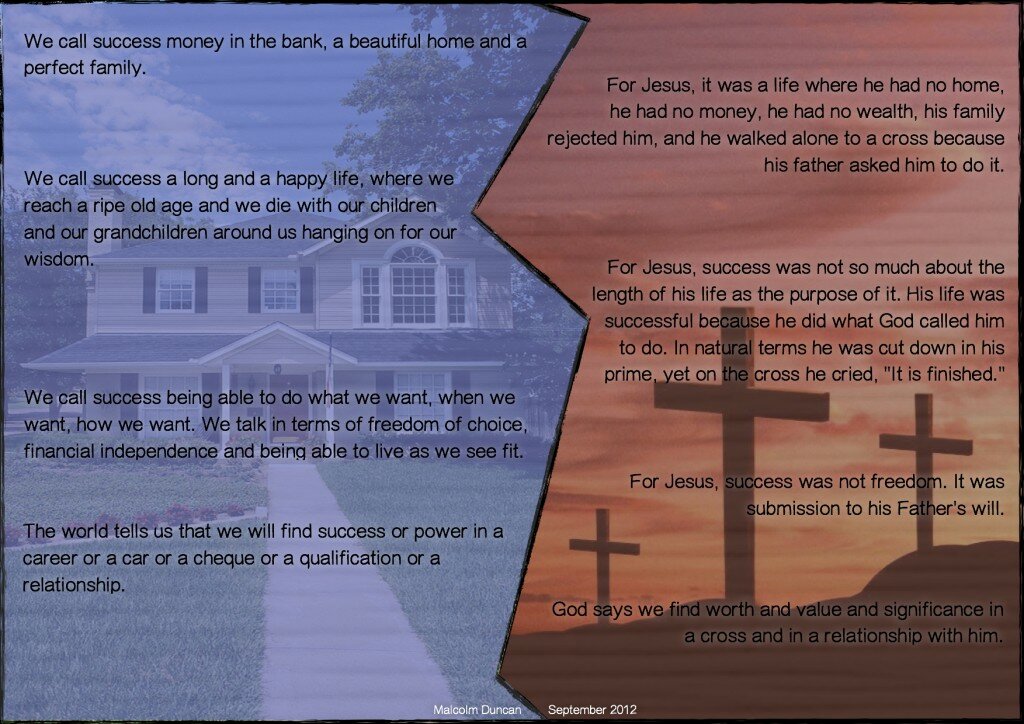I know I shouldn’t but I worry sometimes. I worry about whether I’m going to do well at things. I worry what other people think of me and my work. I worry about letting God down if I mess up or fail at something. I worry about failing instead of succeeding. I don’t want to be a loser. Who does?

We want to be winners, right? We want to achieve and succeed and do well. Of course we shouldn’t just want to do those things so that other people think better of us or like us more. Or to feel good about ourselves. We know that. But we should surely want to achieve, to be winners, to glorify God. Right?
Well, I’m not so sure. At least not in the ways we often think.
Jesus was a winner who lost
Jesus won. He defeated death. He defeated sin. He defeated the Devil. He won. I am not for a second suggesting that Jesus doesn’t have the victory. He does. But how?
There’s a book about the end of the world which I’ve mentioned here before. It’s by . It is a very good book. That title, though. Why not ‘Jesus wins’ or ‘God wins’ (‘Love wins’? Maybe not…)? Why ‘the lamb’? Well, because it was as the lamb that Jesus wins.
In Revelation 5, there is a scene where John the Apostle is weeping because there is no-one who can break seven seals and usher in the completion of God’s plans. But then he is told not to worry, because there is someone who can:
Do not weep! See, the Lion of the tribe of Judah, the Root of David, has triumphed. He is able to open the scroll and its seven seals. (Revelation 5:5)

Brilliant! A lion. That sounds like a mighty victor to me – a lion can surely win the day – they are king of the jungle, after all. So John turns to see the lion, and what does he see?
Then I saw a Lamb, looking as if it had been slain, standing at the center of the throne (Revelation 5:6)
What? A lamb? And one that was slain?! That’s the mighty winner who saves the day and completes the purposes of God? A sacrificial lamb, all bloody and dead?
Yes. Of course we know that. We know that the way Jesus won was by losing. Victory through sacrifice. Triumph through defeat. In one of my favourite parts of the Bible (1 Corinthians 1:18-25) Paul shows his readers who were obsessed with worldly esteem that the cross is a scandal – it is God demonstrating power and wisdom in ways that look weak and foolish.
Jesus won – yes! But he did so by losing.
I’ll be a loser for Jesus!
I’ll level with you. I both love and hate this. I love it because I often feel unimpressive, defeated and a bit of a loser, so it’s nice to know that God has different standards of victory.
But I hate it (wrongly) because it means I’m not allowed to think like the rest of the world. When it comes to power, authority, victory and esteem, Christians don’t have the option of setting our value and sense of success in the same things the world does. And that’s not so easy all the time.
Whether it’s the money in our bank, whether we got that promotion, what car we drive, how many followers we have on Twitter, how people speak of us to our face, how they speak about us behind our back – or one of the million other ways people judge their worth and their success in this world – none of it is what counts for those who identify with the name of Jesus.
God has a different standard, and so must we. Even if that means we have to embrace weakness to be strong, make a sacrifice in order to be victorious, be defeated to know triumph.
Even if it means we feel like a loser.
Here are some words that my pastor, Malcolm, said in a sermon a little over a year ago. As he spoke these words, Mel and I both had tears in our eyes as we were struck once again by just how radical our God is.

So I can’t be a winner, then?
This may sound like I’m saying we can’t set out to achieve, to advance, to succeed in anything. That’s not what I’m saying at all. We just need to be very careful that what we call ‘success’ is the same as what God calls ‘success’.
So, what motivates you? What do you consider success? What do you count as a ‘win’ in your life? Are your answers to those questions informed more by how the world views ‘success’, or by Jesus, who lost in order to be a winner?
And what means are you willing to employ to achieve those successes? Are they the tactics the world use, or are they modelled on Jesus, whose great victory was achieved by dying at the hands of those who sought to hold him back?
Would you rather be a winner in this world, or a loser for Jesus?


















